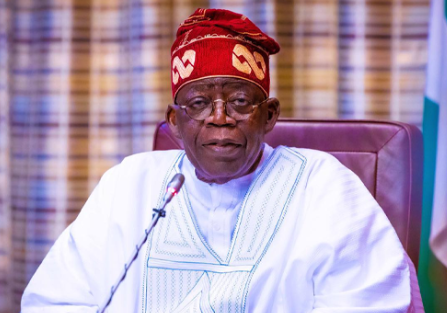
The Presidency stated, on Sunday, that President Bola Tinubu inherited a dead economy but was determined to resolve the nation’s economic crisis.
It was reacting to a New York Times feature story titled “Nigeria Confronts Its Worst Economic Crisis in a Generation,” published on June 11.
The feature,authoured by Ruth Maclean and Ismail Auwal, highlighted the severe economic challenges facing Nigeria.
It noted that soaring inflation and the plummeting national currency contribute to the economic crisis, with millions struggling to feed.
“The pain is widespread. Unions strike to protest salaries of around $20 a month. People die in stampedes, desperate for free sacks of rice. Hospitals are overrun with women wracked by spasms from calcium deficiencies.
“The crisis is largely believed to be rooted in two major changes implemented by a president elected 15 months ago: the partial removal of fuel subsidies and the floating of the currency, which together have caused major price rises,” the New York Times article said.
But in a statement on Sunday, the Special Adviser to the President on Information and Strategy, Bayo Onanuga, said the feature reflected “the typical predetermined, reductionist, derogatory, and denigrating way foreign media establishments have reported on African countries for several decades.”
“Most significant about the report was that it painted the dire experiences of some Nigerians amid the inflationary spiral of the last year and blamed it all on the policies of the new administration. The report, based on several interviews, is at best jaundiced, all gloom and doom, as it never mentioned the positive aspects in the same economy as well as the amelioration policies being implemented by the central and state governments.
“To be sure, President Tinubu did not create the economic problems Nigeria faces today. He inherited them. As a respected economist in our country once put it, Tinubu inherited a dead economy. The economy was bleeding and needed quick surgery to avoid being plunged into the abyss, as happened in Zimbabwe and Venezuela,” Onanuga argued.
The presidential aide said the situation that Tinubu met on the ground necessitated his policy decisions in May/June 2023, which included ending the fuel subsidy regime and unifying the multiple exchange rates.
Onanuga said for decades, Nigeria had sustained a fuel subsidy system that consumed $84.39bn from public funds between 2005 and 2022, despite the country’s significant infrastructural deficits and the urgent need for improved social services for its citizens.
He said, “The state oil firm, NNPC, the sole importer, had amassed trillions of naira in debts for absorbing the unsustainable subsidy payments in its books. By the time President Tinubu took over the leadership of the country, there was no provision made for fuel subsidy payments in the national budget beyond June 2023.
“The budget itself had a striking feature: it planned to spend 97 per cent of revenue servicing debt, with little left for recurrent or capital expenditure. The previous government had resorted to massive borrowing to cover such costs. Like oil, the exchange rate was also being subsidised by the government, with an estimated $1.5bn spent monthly by the CBN to ‘defend’ the currency against the unquenchable demand for the dollar by the country’s import-dependent economy.
“By keeping the rate low, arbitrage grew as a gulf existed between the official rate and the rate being used by over 5,000 BDCs that were previously licensed by the Central Bank. What was more, the country was failing to fulfil its remittance obligations to airlines and other foreign businesses, such that FDIs and investment in the oil sector dried up, and notably Emirate Airlines cut off the Nigerian route.”
Onanuga said it was only necessary for Tinubu to address the critical issues in public finance from day one by eliminating the subsidy regime and curbing the benefits that extended to neighboring countries.
“After some months of the storm, with the naira sliding as low as N1,900 to the US dollar, some stability is being restored, though there remain some challenges.
“The exchange rate is now below N1,500 to the dollar, and there are prospects that the naira could regain its muscle and appreciate to between N1,000 and N1,200 before the end of the year. The economy recorded a trade surplus of N6.52tn in Q1, as against a deficit of N1.4tn in Q4 of 2023. Portfolio investors have streamed in as long-term investors. When Diageo wanted to sell its stake in Guinness Nigeria, it had the Singaporean conglomerate, Tolaram, ready for the uptake.
“With the World Bank extending a $2.25bn loan and other loans by the AfDB and Afreximbank coming in, Nigeria has become bankable again. This is all because the reforms being implemented have restored some confidence.
“The inflationary rate is slowing down, as shown in the figures released by the National Bureau of Statistics for April. Food inflation remains the biggest challenge, and the government is working very hard to rein it in with increased agricultural production,” Onanuga said.
He added that the Tinubu administration, along with the 36 states, was diligently working to increase food production to lower costs.
According to him, certain state governments, including Lagos and Akwa Ibom, have established retail shops to sell raw food items to residents at prices lower than those in the market.
He added, “The Tinubu government, in November last year, in consonance with its food emergency declaration, invested heavily in dry-season farming, giving farmers incentives to produce wheat, maize, and rice. The CBN has donated N100bn worth of fertiliser to farmers, and numerous incentives are being implemented. In the western part of Nigeria, the six governors have announced plans to invest massively in agriculture.
“With all the plans being executed, inflation, especially food inflation, will soon be tamed.
“Nigeria is not the only country in the world facing a rising cost of living crisis. The USA, too, is contending with a similar crisis, with families finding it hard to make ends meet. US Treasury Secretary Janet Yellen raised this concern recently. Europe is similarly in the throes of a cost-of-living crisis. As those countries are trying to confront the problem, the Tinubu administration is also working hard to overturn the economic problems in Nigeria.”













